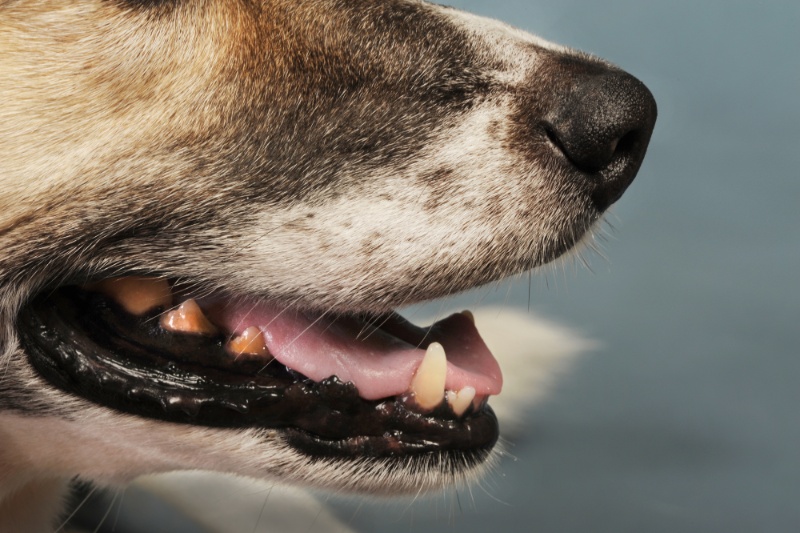Have you ever experienced a time when the pungent breath of your beloved dog made you rethink your decision to become a pet owner? It’s a common feeling among many. When your furry companion exhibits a persistent, unpleasant smell from their mouth, it’s important to keep an eye on it, but there’s no immediate cause for alarm. Understanding the causes of bad dog breath is key, as not every instance is a sign of serious dental problems.
In this helpful article, we delve into the typical causes of your dog’s less-than-fresh breath in a straightforward manner. We’ll also discuss why it’s not always necessary to rush to the veterinarian for every bout of bad breath in your dog!
6 causes of bad dog breath
1. Poor dental hygiene
Inadequate dental care in dogs leads to the accumulation of plaque, a sticky film of food particles and bacteria. If left unchecked, this plaque can harden into tartar, a more challenging substance to remove, and significantly contribute to the growth of odour-producing bacteria in the mouth, causing bad dog breath.
This buildup of tartar is a primary factor in the development of gingivitis, an inflammation of the gums, and periodontal disease, a more severe condition that affects the gums and the bones supporting the teeth. Both gingivitis and periodontal disease are serious and can cause significant discomfort and pain for your dog.
2. Diet
Certain types of dog food, particularly those high in sugars and processed ingredients, can contribute to a rise in odour-producing bacteria or heightened acidity levels in your pet’s mouth. These conditions are conducive to plaque formation and bad dog breath.
Conversely, a nutritious and balanced diet, rich in essential vitamins, minerals, and fibre, plays a vital role in maintaining your pet’s oral health. Such a diet not only helps in keeping the mouth clean but also aids in preventing the accumulation of plaque, thereby contributing to overall dental hygiene and reducing the likelihood of bad breath.
3. Oral disease can cause bad dog breath
Oral diseases in dogs, particularly gingivitis, warrant serious attention and care. Gingivitis, characterised by the inflammation of the gums, arises from bacterial activity. These bacteria thrive on the plaque that accumulates around the teeth. If this condition is not addressed promptly, it can escalate to periodontal disease, a more severe oral health issue that impacts the entire mouth, including gums and teeth. Be vigilant for signs of gingivitis in your dog, such as gums that appear red or swollen, bleeding during brushing or while eating hard foods and visible signs of tooth decay.
Prompt detection and intervention are crucial for effective treatment and management of these oral conditions. Therefore, it is important to regularly monitor and maintain your dog’s oral hygiene, ensuring their gums and teeth remain healthy. Regular dental check-ups and proper oral care routines are integral to preventing the onset and progression of such dental diseases.
4. Teething in puppies
During the teething phase, a puppy experiences heightened saliva production, which, coupled with an increase in plaque-causing bacteria on their gums, often results in temporary bad breath. This is a natural part of a puppy’s development as their new teeth break through the gums, creating an environment conducive to bacterial growth.
To effectively manage this, it’s important to establish a routine of regular oral hygiene. Begin with gentle brushing sessions, using a soft-bristled toothbrush or fingerbrush specifically formulated for dogs. This helps in removing plaque and keeping the puppy’s mouth clean.
Additionally, feeding your puppy high-quality wet foods that contain natural ingredients can aid in maintaining overall oral health. These types of foods are typically easier for a teething puppy to eat and digest, and the natural ingredients can contribute to a healthier oral environment, reducing the likelihood of bad breath.
As an added note – when your pup’s teeth start to break through, they may need a teething gel to calm and soothe them as this process can be stressful for both pets and parents!
5. Foreign objects
If an object becomes stuck between your pet’s teeth or wedged in their gums, it can lead to infection and result in an unpleasant odour. Such situations, if not addressed promptly, can escalate to more severe dental issues like tooth loss or the formation of abscesses, necessitating professional veterinary care.
To prevent objects from getting lodged in your dog’s mouth, it’s essential to closely monitor them, especially during outdoor play. Vigilance is key in ensuring they don’t pick up harmful items. Additionally, incorporating a daily tooth brushing routine for your dog can significantly help in maintaining oral hygiene and allows you to check for any foreign objects or early signs of infection.
Should you observe any unusual behaviour or symptoms, it’s advisable to carefully examine your dog’s mouth. Use a cotton swab to gently explore the gums and teeth, being mindful of any indications of discomfort or distress from your pet. This gentle probing can help you identify any foreign objects or areas of concern that may need further attention or a visit to the vet.
6. Underlying medical conditions
Bad dog breath can sometimes be indicative of more serious underlying health issues, such as diabetes. This condition arises when your pet’s body is either unable to produce sufficient insulin or cannot utilise it effectively. This disruption in insulin function leads to elevated glucose levels in the bloodstream. One noticeable symptom of this imbalance is a distinctly sweet or fruity odour emanating from your dog’s breath.
It’s crucial to keep a watchful eye on your dog’s overall health to spot any signs that might suggest altered metabolism, a common consequence of diabetes. Key indicators to look out for include unexpected weight loss or a noticeable decrease in energy levels and activity, which may manifest as lethargy. Early detection of these symptoms allows for timely diagnosis and treatment, potentially averting more serious complications associated with the disease. Regular veterinary check-ups and monitoring of your dog’s health and behaviour can be vital in maintaining their well-being.
VETIQ’s Denti-Care Kit is the perfect solution for bad dog breath!
Maintaining good oral hygiene is vital for ensuring your dog’s breath remains fresh and their teeth stay healthy. Recognising this, VETIQ’s Denti-Care Kit has been developed as part of our expanded Denti-Care range to offer hassle-free solutions to pet parents dealing with stinky breath!
Our Enzymatic toothpaste, a key component of this range, features a unique formula that fights tartar and plaque, ensuring clean teeth and fresh breath. Its natural ingredients, including the glucose oxidase enzyme, combat harmful microorganisms in your pet’s mouth.
Furthermore, for puppies and younger dogs, VETIQ Teething Gel is a game-changer. This sugar-free gel, rich in natural soothing agents like chamomile, peppermint, and clove oils, alleviates the discomfort of teething. Easy to apply, it’s a must-have for puppies experiencing gum soreness.
Discover the benefits of Denti-Care products from VETIQ for your pet’s dental health. From puppies to adult dogs, our range ensures a clean, healthy mouth and fresh breath – so take a crucial step towards proactive dental care and ensuring your furry companion’s long-term health and happiness!








